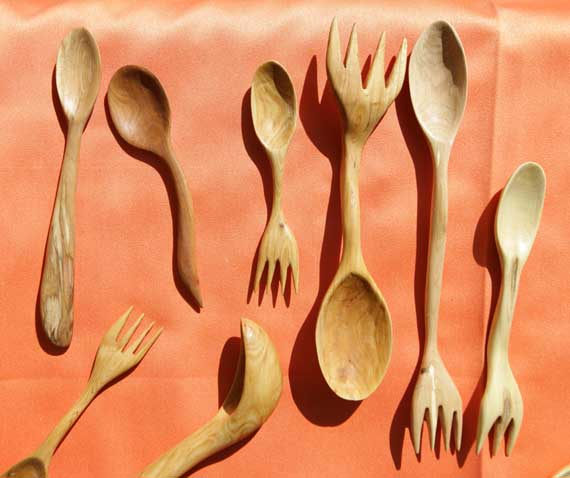A common household object, the spoon in the Bulgarian traditional culture has acquired a special role in a range of rituals and occult practices.In the Bulgarian lands the spoon has been in widespread use since very ancient times. A few museum collections feature spoons in various sizes and shapes made depending on the era from clay, stone etc. For obvious reasons their wooden siblings are more recent but they are also widely mentioned in tales,  songs and beliefs. The wooden spoon has never actually left Bulgarian homes. Even though metal cutlery has been part of urban lifestyles for centuries, wooden stirrers, ladles and any other helpers in the kitchen are still used by many. In the meantime, nutritionists have recently been advising us to prepare food with wooden items in a bid to avoid harmful compounds formed as metal interacts with some food ingredients.
songs and beliefs. The wooden spoon has never actually left Bulgarian homes. Even though metal cutlery has been part of urban lifestyles for centuries, wooden stirrers, ladles and any other helpers in the kitchen are still used by many. In the meantime, nutritionists have recently been advising us to prepare food with wooden items in a bid to avoid harmful compounds formed as metal interacts with some food ingredients.
As reported by great Bulgarian ethnographer Dimitar Marinov, the spoon is often present during incantations and magic. Three, seven or nine spoons were used to break the dangerous spell of evil eyes. For this kind of treatment to succeed, the spoons should have been collected from three, seven or nine homes. Also, these spoons would be used to either cast or break magic, for skimming milk from livestock, for harvesting the corn from the fields, and for matchmaking. They were believed to have the power to "loosen" or "tie" the groom, i.e. to help or prevent him from fulfilling his obligations on the wedding night. Therefore during traditional weddings relatives of the bride and groom were inspecting thoroughly clothing items and blankets in the room prepared for the night.
Like other manmade things, spoons may have various properties and uses depending on the material. The best spoons for cooking are made of oak, beech or maple. White magic and breaking the spell of evil eyes required different wood, such as elm, ash or hornbeam. Sorceresses opted for boxwood spoons for their magic. Christmas carols often mention boxwood spoons. In them the housewife (or the golden maid) eats and drinks with a boxwood spoon and a boxwood bowl. By the way, in traditional beliefs boxwood was among very few plant species banned from the homes. It was meant to serve funeral rituals and masses and would only enter houses on Christmas when it was used to make special Christmas posies.
According to one belief, а spoon thrown over the head of а man releases him from fear. In an extended version of the ritual a little salt and water was put into the spoon, the content was drunk and the spoon was thrown up the same way. This was repeated several times until the spoon fell with its concave side up. It was believed that while the spoon was falling back, the fear had not left the man.
The protective power of the spoon was widely in use in the first days after birth when young mothers were banned from leaving the house. The women could go out only if they carried a lighted candle or charcoal on a tile, singed cloth and garlic to banish demons. Another mandatory item to have was a wooden spoon tied with a red thread.
The spoon was a mediator of sorts sending off various signs and warnings and giving lessons to people. If an extra spoon is placed on the table, a guest should be expected. If one eats with two spoons, she or he will marry twice. A spoon that has fallen from the table implies that a woman-visitor would come and if it is a knife - that a man-visitor should be expected. Two guys should never eat with the same spoon - not for the sake of hygiene but because they would otherwise quarrel bitterly.
The spoon takes center stage in some Bulgarian idioms, like for example, when we say that something is not a spoon for one's mouth, we mean the guy in question has taken up a job that exceeds his potential. And here is another one: If you look for a big spoon, first take a big hoe, meaning that anybody greedy for either too much food or big results has to work very hard to make it.
English Daniela Konstantinova
The Eastern Rhodopes come to life in the heart of Sofia – with authentic flavoуrs, music and craftsmanship . Residents of the Bulgaria capital have a chance to immerse themselves in the atmosphere of Momchilgrad Municipality and its cultural and natural..
The second annual Bean and Sausage Festival promises to be an unforgettable celebration of flavour and folklore in Zhitnitsa , a village in southern Bulgaria. On 7 September, the grounds of the local equestrian centre will host food lovers..
The Regional Open-Air Ethnographic Museum "Etar" was established as a center for the study of the traditional culture of the Balkan Range people. Today, this unique site near Gabrovo serves as a place where customs and traditions from the Bulgarian..

+359 2 9336 661
